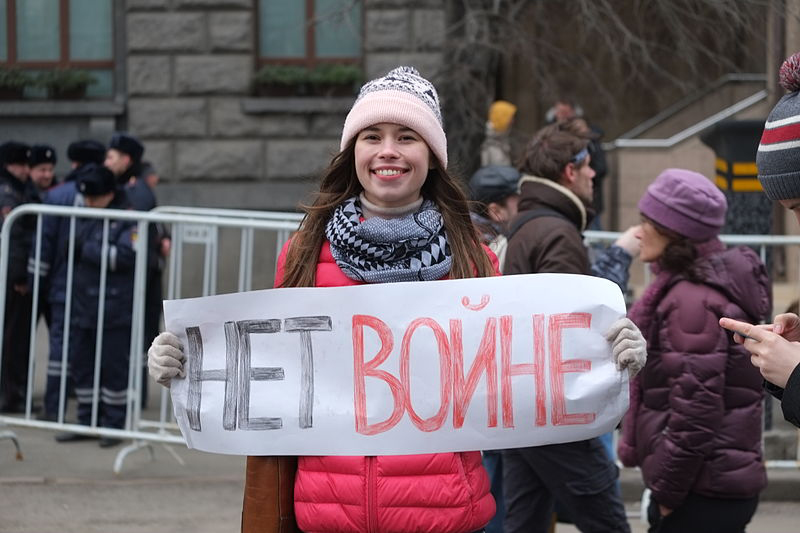The hysterics are deafening: The “invasion” of Crimea has the pundits in an uproar, with the Krauthammers and Kristols and Kagans calling for a new cold war (verging on hot), and the “progressives” chiming in with calls for sanctions and making Vladimir Putin “pay a price,” as the President put it. Even some “libertarians” are getting up on their high-as-a-kite horses, condemning the Russians and attacking Ron Paul, who dared pose the question, “Crimea—so what?”
The D.C. wing of the libertarian movement was horrified. How could Paul say such a thing? Why wouldn’t he condemn the Russian invasion?
This is a peculiar invasion—if that, indeed, is the word to describe it. To begin with, it wasn’t necessary for a single Russian soldier to cross the border, because the Russian soldiers were already there. Second, this is one conquest accomplished without the loss of a single life: Nary a shot was fired.
When the Americans went into Iraq, they foolishly expected to be met with showers of rose petals; instead, they were met with showers of bullets. We wound up killing over half a million Iraqis, maiming twice that, and wrecking their country.
When the Russians took back Crimea, they were met with rose petals—and two thirds of the Ukrainian navy defected to their side. When a country is invaded, the response of the populace is usually to mount some kind of resistance, but there’s no sign of that in Crimea. While the Tatars are grumbling, the referendum our wise leaders claim is illegitimate quite obviously reflected the true sentiments of the overwhelming majority of Crimeans. The region, after all, has been a part of Russia since the days of Catherine the Great.
As I write, the same “intelligence” agencies that didn’t see Crimea coming are now saying that Putin is about to take the rest of Ukraine, but that isn’t going to happen. While Russian-speakers predominate in the eastern part of the country, there’s no strategic value in the outmoded factories and Detroit-like conditions prevalent in the region. Crimea holds historic value as the pearl in the Russian crown and, of course, as the location of the port of Sevastopol, home of the Russian fleet.
Putin isn’t going west; his problem is that NATO is moving east. While Ukraine is unlikely to join the club, Georgia has been angling for entry, and then there’s Trans-Dniester, a sliver of Moldova that also wants union with Russia. This could easily turn out to be the new flashpoint of a revived cold war. Yet the real danger is that a provocation by the extreme Ukrainian nationalists in the east could cause a border incident—just as the mysterious sniper attack in Kiev set off the coup that sent the elected president, Viktor Yanukovych, into exile.
According to the Estonian foreign minister, Urmas Paet, those snipers were firing at both the protestors and Yanukovych’s police; in an intercepted conversation, Paet told Catherine Ashton, the top E.U. diplomat, that it’s likely the snipers were deployed by the coup leaders themselves in order to spark an incident. Recall that a deal had been reached with Brussels shortly before the shooting, in which Yanukovych agreed to concessions in exchange for calling off the mob—but the sniper attack put an end to that. Mission accomplished.
The ultimate mission to be accomplished, as far as the War Party is concerned, is regime change in Russia: Putin has challenged the masters of the West once too often, and they are determined to bring him down. After ridding Russia of the worst of the oligarchs, he went on to denounce America’s hegemonic conceits in terms that the lords and ladies of Washington could not countenance. His outflanking of Obama in Syria—with a little help from the American people—would have been enough to arouse the vengeful ire of Western leaders, but the really unforgivable transgression was harboring Edward Snowden, the Emmanuel Goldstein of today.
Ramshackle Russia, still reeling from the collapse of the Soviet Union, is gathering what remains of her strength, rising from the ashes of Leninism and Yeltsinism, and readying herself for the final struggle with the relentless West. We are entering a new danger zone, and it’s located—once again—in Europe, where the NATOcrats are at the very gates of Moscow, clamoring for the czar to surrender, or else. History is repeating itself, albeit turned upside down—with America the revolutionary power, funding subversion and spreading disorder, and the Russians playing the role of the conservative upholders of tradition and national sovereignty.
Funny how that worked out.
[Image by Ilya Schurov (Flickr: S0508332) [CC-BY-2.0 (http://creativecommons.org/licenses/by/2.0)], via Wikimedia Commons]

Leave a Reply